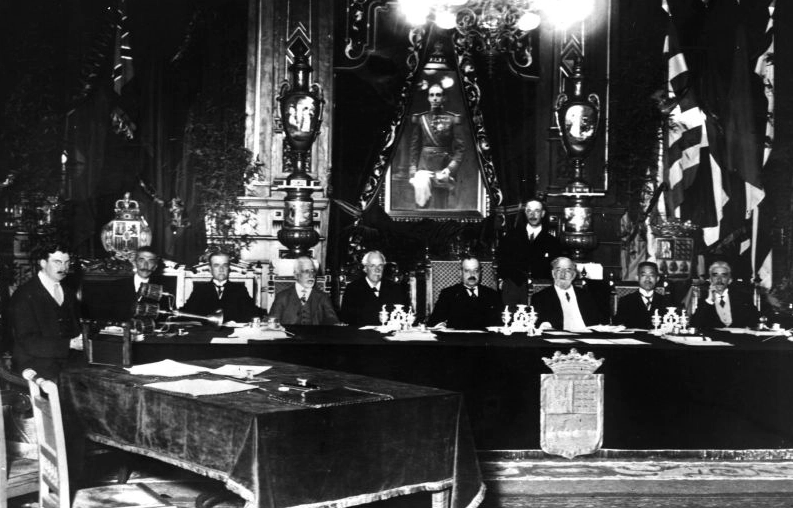
The dream of a global organization to prevent war and foster international cooperation extended back more than a generation. It found support among a wide range of American statesmen, including former President William Howard Taft, Theodore Roosevelt, and Henry Cabot Lodge.
When Wilson brought the treaty home in the summer of 1919, he enjoyed the support of a broad cross-section of Americans, including the press, universities, and business. But that support was thin. Republicans who controlled Congress derided the treaty as a naïve, dangerous organization that would strip America of its sovereignty. It would, they argued, give a foreign body the power to declare war. It threatened the Monroe Doctrine, they said, and with it the order of the Western Hemisphere. They vowed to defeat this vision and return America to its prewar world of working, family and community life, and consumerism.
Republicans spoiled for a fight. For years, Republicans simmered as Wilson enacted a broad platform of Progressive domestic legislation, campaigned against entry into the Great War in 1916, and then brought America into the war the very next year. Republicans resented Wilson’s aloof and preaching style, his inability to acknowledge their ideas or legitimacy. When Wilson refused to invite leading Republicans to the Paris peace conference, they began to plot his defeat. Senate Majority Leader Henry Cabot Lodge met, behind the scenes, with former President Theodore Roosevelt, corporate financiers, and media titans like George Harvey to plot a campaign to defeat Wilson and the League.
In July and August, Wilson and the Republicans made half-hearted efforts to find common ground. Republicans demanded reservations and amendments to the treaty. Wilson, as Lodge predicted, refused to accept any changes. The two sides attacked each other in raw, personal terms. Meanwhile, the Democratic minority was cracking. As the Senate’s able party leader lay dying, his inexperienced second-in-command took over. Senate Democrats supported Wilson but also resented his high-handed treatment of friends and foes alike. When Wilson agreed to meet with three dozen senators, one on one, to make his case for the treaty, he did most of the talking. He rejected ideas for compromise or even outreach.
To end the stalemate, the two sides took opposite strategies. When Lodge proposed 50 changes to the treaty, Wilson grew angry. He decided that direct bargaining was a fool’s errand. Rejecting the health concerns of his doctor and his wife, he decided to leave Washington to barnstorm for the treaty. He would travel all over the West, for a month, to arouse the American people to back the treaty. Once Wilson made his case, he believed, the people would force the Senate to approve the treaty. Greeted in Europe as a great liberator, Wilson thought he could recreate that magic in America. Words, he believed, would save the day.
During the Great War, Wilson had enlisted savvy and competent men to help him win the war. With the help of an innovative propagandist named George Creel and the Committee on Public Information, Wilson managed public opinion. Meanwhile, Wilson enlisted the legendary financier Bernard Baruch to run the war at home and General George Pershing to command American troops overseas. Wilson was the headliner for three remarkable teams that won the greatest war in history. But these figures had all drifted away. Now Wilson was alone, with his wife, doctor, and secretary. Without any real political machinery, Wilson would rely on the power of his own speechmaking to win the day.
Rather than confront Wilson and the pro-League alliance head on, the Republican opposition used tactics of delay and division to foster doubts and fear in the American public. Then, with the president weakened—as much by his own stubbornness as their attacks—they would hammer him mercilessly. Working behind the scenes, they developed a modern propaganda machine resembling the wartime Committee for Public Information. They organized plutocrats and media leaders to overwhelm the nation with information and misinformation against Wilson and the League.
Senator Lodge, who scorned Wilson and his romantic visions, took charge of the opposition. Lodge assembled the anti-League coalition of disparate groups—isolationists, balance-of-power realists, the military complex, free traders and protectionists, anticommunists and anti-Germans, and more. Whatever their reason for skepticism, Lodge cultivated them all.
As Lodge waged trench warfare, Wilson, impatient and unfit for such warfare, decided to go “over the top” to charge his enemies and attack them in the open.
